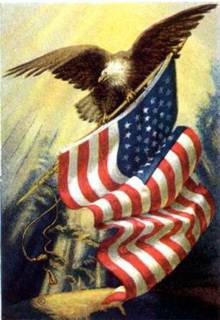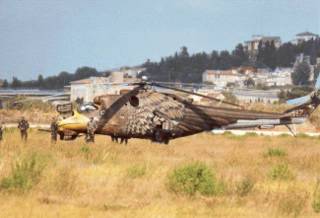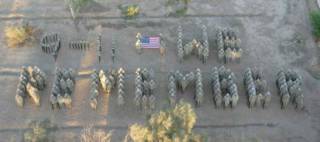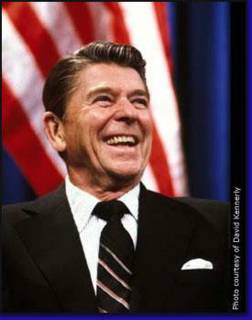By Marcia Klein
Special to American Forces Press Service
FORT BELVOIR, Va., Oct. 27, 2004 -- "With Sept. 11, I
really felt violated when the Pentagon was
attacked. I [had] worked there for several years, and I
took it personally," said Maurice Stewart,
a DoD civilian employee deployed to Kuwait.
Stewart's life changed with a throw of the dice when he was
9 years old. Today he is taking another
gamble – his duties in Kuwait include frequent trips into
Iraq and to the Horn of Africa. He
volunteered to go, he said, because his country gave him
opportunities, and he believes it's his
duty to give back.
"I wanted to do something and made up my mind right then
that, when given the opportunity, I was
going to volunteer. The Defense Department has been a
pillar of my life. It provided me a good
career. It has helped educate me," the 47-year-old Stewart
said during a late-night phone interview
recently from his office at the U.S. Central Command
Deployment Distribution Center in Camp
Arifjan, Kuwait.
"Basically this is my way of helping with the war on
terrorism and giving back to the government
what they've provided to me," he said. "The 26 years that
I've put in doing this business has been
to support the forces when they are deployed and protecting
the United States and now fighting this
war. So you know, it's part of my duty."
Stewart is the deputy chief of sustainment in the CENTCOM
DDOC, a partnership between the Defense
Logistics Agency and U.S. Transportation Command. In Kuwait
he works to improve the distribution
and visibility of supplies for troops serving there and in
Iraq.
Stewart might not be serving his country today if he hadn't
been lifted out of a harmful,
potentially deadly lifestyle at the age of 9 by a virtual
stranger. He was on his knees in the dirt
of a playground, shooting dice with other neighborhood
kids, when a man stopped and talked to him.
The man, Fred Saunders, only knew Stewart as a kid who had
been cut during Little League tryouts
two weeks earlier.
"He just said, 'Hey, I've got four children and I just want
to offer you a place to come and call
home if you want, and I'll treat you just like I treat my
own children. And you'll know there's
nothing I wouldn't do for you that I wouldn't do for
them,'" Stewart said.
That reads like a Frank Capra film script, but it's not
fiction. Without Fred Saunders, Maurice
Stewart might have ended up like many of his classmates
from the tough Youngstown, Ohio,
neighborhood he grew up in -- dead or in prison.
Saunders never said why he took Stewart under his wing, but
it was a life-changing moment for a
young boy left by his mother at six months of age with an
elderly couple not related to him.
"(Saunders) and I have been thick as thieves, as they say,
from that point to now. Everywhere I've
been, he's been there. Even before I left to come over
here, he came down and spent a week with me,
and he's 75 years old. So he's my dad, and I wouldn't
replace him for anything," Stewart said.
He says the experience of his early years were part of the
reason he wasn't afraid to volunteer to
deploy into a war zone.
"I grew up in a tough environment. I don't worry about
that," he said, adding that he understood
going in that he had to keep his vigilance up. "You know
the type of environment that you're in,
okay? My vigilance is up in Kuwait and Camp Arifjan and the
surrounding area. When I go up north,
I'm even more aware of my surroundings, so this is what I
expect. I didn't expect to come over here
and let my guard down and when things get tough, crawl in
the corner. That's not my makeup."
Stewart said he has experienced some interesting things
during the almost six months of his
deployment: the midnight mortar attack that shook the
portable bathroom he was in, the 15-inch,
brown "sand" lizards that like to share his tent, the
"tactical landing" the plane made as he
traveled north to help out in Balad, Iraq.
"We were on a C-130, and a week prior a young man had
gotten shot getting off the plane at the
airfield. So when they land, engines stay running. We had
flak jackets on, helmets on. They drop
down the cargo ramp, you run out and run to the truck and
go," he said calmly. "So, that was
different."
Stewart's job back home at the Defense Logistics Agency
headquarters on Fort Belvoir involves
helping establish and communicate DoD's policy for
"automated information technology" in such areas
as radio frequency identification tags, bar codes and
unique identifier codes. In Kuwait, Iraq and
surrounding regions, he helps train military, government
civilians and contractors in using that
policy and related processes to be able to accurately track
and document supply shipments.
"I'm sharing, from the policy perspective, how things are
supposed to work and helping show them
how to write the (RFID) tags (that help track supplies)
with the right level of content detail for
the materials that are being shipped. We're going from
policy to 'boots on the ground,'" he said.
"We're just assisting them with some of the things they
haven't seen yet because some of this
(doctrine and policy) is so new that it's not in all the
military services schoolhouses yet."
Although the living there isn't easy, Stewart said he gets
up every morning ready to go to work. "I
tell you what, the folks (here) come from all the military
services, TRANSCOM and DLA, and the
people here are great. The leadership is top-notch. So when
you're in an environment like this, and
you've got good leadership and good co-workers and
colleagues, it makes getting the job done easy.
I mean, it's a challenge, but … I come in every morning and
I'm energetic."
That doesn't mean he won't be ready to return to his wife
and daughter, who turned 12 while he was
away. He said they both supported his decision to deploy to
help the troops, and they exchange e-
mails daily. Stewart said he explained to his daughter that
he was going to help get the troops the
support and supplies they needed.
His daughter "says she's doing her part on her end in
school and gymnastics and she expects me to
do my part on this end," Stewart said. "She wrote me, 'Dad,
I know it's hot, it's tough, you work
long hours, but I expect you to do good and represent the
Stewarts.'"
He laughed quietly. "So you can imagine if you're over here
and your kid is talking that way … it
kind of motivates you. You can't do anything but come over
here and do well."
(Marcia Klein is a public affairs specialist in the Office
of Public Affairs, DLA Headquarters,
Fort Belvoir, Va.)











































